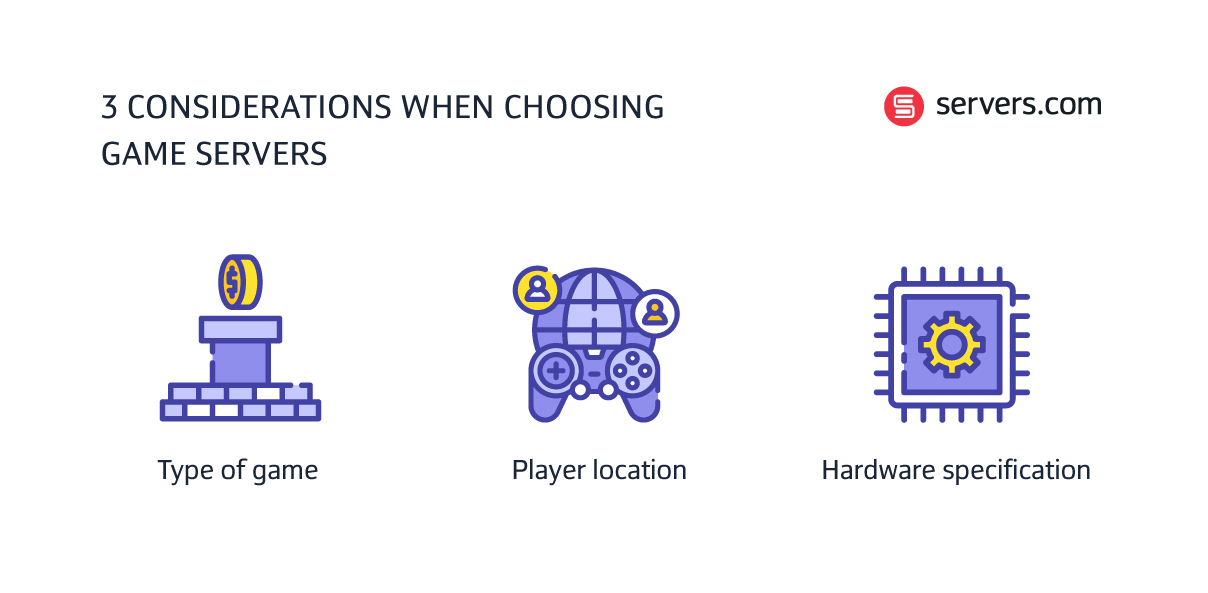

Choosing the right game server hosting is all about understanding the needs and wants of your customers, to deliver the best experience possible. Select the wrong game server infrastructure and your game will always underperform, driving away players. Finding the best game server hosting for your specific needs will ensure that you can deliver an exceptional experience that keeps players coming back for more.

There are three main types of gaming: single player, synchronous multi-player and asynchronous multi-player games.
Single player games are the least resource-intensive on your server. While these games can be super immersive with rich graphics and large “worlds”—think Red Dead Redemption and Minecraft—they don’t require the low latency connections that a multi-player game does. Other than the occasional in-game purchase or leaderboard, there is little information sent back to the server.
Asynchronous multi-player games require a little more input from the game server infrastructure. Here we’re talking about your turn-based games like Words With Friends where you engage with other players, but not in real time. Although actions aren’t as time sensitive as quick-fire shooting games, a server must still receive an action from one player and relay it to the next.
Your game hosting servers will really be put to work for synchronous multi-player games. When two or more players are engaging in real time action (Fortnite, CS:GO and the like), a powerful server must be used to ensure the low latency network connections that make rapid play possible.
The type of game you’re developing will impact your choice of game server infrastructure for hosting a game server. If your game is suitable for peer-to-peer networking, you don’t need to set up a game hosting server at all – your players will connect directly to each other’s computers and won’t need game server hosting to support the event.
If you’re hosting games like Minecraft or CS:GO, a dedicated game server will provide you with the computing resources required to run the game efficiently and deliver an exceptional experience for your players.
For more detail take a look at our blog on the topic - Differences between peer to peer and dedicated game server hosting.
Are they predominantly in one or two countries? Or spread around the world? Understanding where your players are located is key to choosing the best game server hosting option for you. In virtually all computing scenarios, speed is crucial – but none more so than in gaming. Game servers are a latency-sensitive application. Players experience games at their best when latency is below 60-100ms at the time of everyone playing together.
Latency is the time it takes for data to travel from the setup game hosting server to your players. The lower the latency in gaming, the better the experience because game information is being transferred more quickly. When you hear players complaining about “lag” it’s a sure sign that they have high latency on their connection due to the setup of the game hosting server, and their experience is being compromised.
By locating game server infrastructure closer to your players, you can help to reduce latency. Even using fiber optic cable transmitting data at the speed of light, every additional physical mile increases latency fractionally. Sending data from London to Paris will be much faster than London to New York because the distance between points is far shorter.
To ensure a consistently good experience for everyone, players need to be located as close as possible to the game server infrastructure hosting their game. For a truly global player base, you may need to choose gaming server hosts that operate an international network of data centers.
Ask yourself - what is the optimal specification of game server infrastructure you need to ensure a speedy, efficient gaming experience for players?
As discussed in our previous blog - How to host game servers - cloud server providers typically offer high density hardware powered by lower-speed multi-core CPUs. Although fine for general business computing tasks, these machines don’t offer sufficient clock speeds to meet the demands of high-performance gaming and are therefore not necessarily the best game server hosting option.
In order to get maximum value from your game server hosting package and setup, consider how you can make the most of the multi-core CPU. In theory you will be able to run multiple instances of the game server application on the same hardware or dedicated server – but you must ensure you specify enough RAM for each core.
This is where your choice of game server hosting partner becomes even more important. The right gaming server hosts will help you set up game hosting server options to test and find the optimal configuration for your game. In fact, we’d go so far as to say that if a provider is unwilling to help with this essential specification step, they probably aren’t the right partner for you.
So there you have it, three factors to consider as you prepare to take your game live with the best game server hosting for the job. If you’ve found a gaming server host that ticks the box on each of these questions, chances are you’ve found your ideal game server hosting partner.

Hannah is an experienced communications professional, with a decade-long career developing memorable campaigns for some of the world's biggest technology companies. She has a keen eye for detail and flair for creativity.